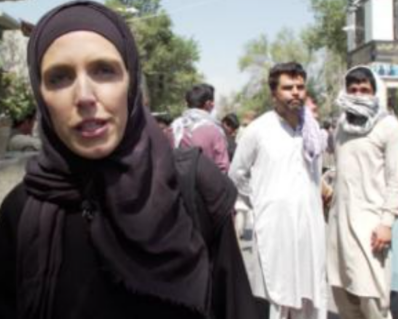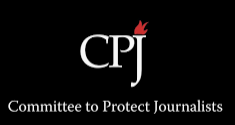 |
| CNN's Clarissa Ward being watched |
The swift Taliban takeover of Afghanistan has news organizations simultaneously trying to cover the story, protect their journalists and families, and help people who have done work for them over the past two decades, according to the UK's Press-Gazette.
Video of chaotic scenes from the Kabul airport were frequently repeated during news reports of the fast-developing story Monday, which President Joe Biden addressed in a speech to the nation.
CNN reporter Clarissa Ward, in an interview from Afghanistan, said even some Taliban fighters she had spoken to were surprised at the speed the country fell.
“I don’t think they ever doubted they would win,” she told The Associated Press. “But I don’t think they anticipated it would happen this quickly.”
Ward’s own reporting from Kabul streets illustrated uncertainties about the country’s future. At one point, she noted that the Taliban had given her permission for CNN to film a report, but she was asked to stand to the side “because I’m a woman.”
She adjusted her attire to reflect the takeover by the more culturally conservative forces, wearing a tighter head covering that obscured her hair.
News organizations were continually assessing security needs: At one point NBC News’ Richard Engel said the network had moved out of its office to a safer location. CBS News’ Roxana Saberi reported from her hotel room on “CBS This Morning” on Monday because the facility was on lockdown.
The Committee to Protect Journalists said it had fielded requests from 475 journalists in Afghanistan – who work for both local and international news organizations – for help leaving the country, said Maria Salazar-Ferro, the organization’s emergencies director.
CPJ is working with the US military, along with governments in Canada, France, Germany and Britain, to seek landing places for some of these journalists and their families, she said. But for much of Monday, no planes were leaving Kabul.
News organizations, many of them working together, are making day-to-day decisions on where journalists should be deployed for safety reasons.
Safety is always a concern for journalists in unstable countries. The added element in Afghanistan now, as it was previously in Iraq, is the safety of people – not just journalists but drivers, translators and others – who helped news organisations at different points in the 20 years the US and UK fought in the country.
The AP is seeking visas for what may amount to hundreds of people, including current and former staff, freelancers and their families.
“It’s a moral duty,” said Ian Phillips, AP’s vice president for international news. “They may not work for us now, but they worked for us in difficult years.”

No comments:
Post a Comment
Note: Only a member of this blog may post a comment.